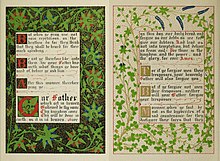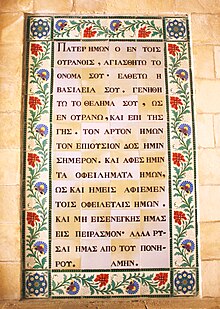Lord's Prayer
Protestants usually conclude the prayer with a doxology (in some versions, "For thine is the kingdom, the power and the glory, for ever and ever, Amen"), a later addition appearing in some manuscripts of Matthew.In biblical criticism, the absence of the Lord's Prayer in the Gospel of Mark, together with its occurrence in Matthew and Luke, has caused scholars who accept the two-source hypothesis (against other document hypotheses) to conclude that it is probably a logion original to the Q source.[13] [14] If either source built on the other, Joachim Jeremias attributes priority to Matthew on the grounds that "in the early period, before wordings were fixed, liturgical texts were elaborated, expanded and enriched".[15] On the other hand, Michael Goulder, Thomas J. Mosbo and Ken Olson see the shorter Lucan version as a reworking of the Matthaean text, removing unnecessary verbiage and repetition.[19] The text[20] given here is that of the latest edition of Greek New Testament of the United Bible Societies and in the Nestle-Aland Novum Testamentum Graece.[34] The translators of the 1611 King James Bible assumed that a Greek manuscript they possessed was ancient and therefore adopted the text into the Lord's Prayer of the Gospel of Matthew.In the official International Commission on English in the Liturgy (ICEL) English translation, the embolism reads: "Deliver us, Lord, we pray, from every evil, graciously grant peace in our days, that, by the help of your mercy, we may be always free from sin and safe from all distress, as we await the blessed hope and the coming of our Saviour, Jesus Christ."These believe that Jesus' commands to feed the hungry and clothe the needy make the seeds of the kingdom already present on earth (Lk 8:5–15; Mt 25:31–40).Hilda C. Graef notes that the operative Greek word, basileia, means both kingdom and kingship (i.e., reign, dominion, governing, etc."[52] John Ortberg interprets this phrase as follows: "Many people think our job is to get my afterlife destination taken care of, then tread water till we all get ejected and God comes back and torches this place.[56] Barclay M. Newman's A Concise Greek-English Dictionary of the New Testament, published in a revised edition in 2010 by the United Bible Societies, has the following entry: ἐπι|ούσιος, ον (εἰμί) of doubtful meaning, for today; for the coming day; necessary for existence.[citation needed] Anthony C. Deane, Canon of Worcester Cathedral, suggested that the choice of the word "ὀφειλήματα" (debts), rather than "ἁμαρτίας" (sins), indicates a reference to failures to use opportunities of doing good.He linked this with the parable of the sheep and the goats (also in Matthew's Gospel), in which the grounds for condemnation are not wrongdoing in the ordinary sense, but failure to do right, missing opportunities for showing love to others.VIII)[74][75] Coherently, Saint Cyprian of Carthago translates Matthew 6:9 as follows: And suffer us not to be led into temptation; but deliver us from evil.[79] Joseph Smith, the founder of the Latter Day Saint movement, in a version of the Holy Bible which was not published before his death, used: "And suffer us not to be led into temptation".He was referring to the 2017 change to a new French version, Et ne nous laisse pas entrer en tentation ("Do not let us enter into temptation"), but spoke of it in terms of the Spanish translation, no nos dejes caer en la tentación ("do not let us fall in/into temptation"), that he was accustomed to recite in Argentina before his election as Pope.[needs update][85] The Italian-speaking Union of Methodist and Waldensian Churches maintains its translation of the petition: non esporci alla tentazione ("do not expose us to temptation").Matthew's version of the prayer appears in the Sermon on the Mount, in earlier parts of which the term is used to refer to general evil.The doxology sometimes attached to the prayer in English is similar to a passage in 1 Chronicles 29:11 – "Yours, O LORD, is the greatness and the power and the glory and the victory and the majesty, for all that is in the heavens and in the earth is yours.[97][110][111] C. Clifton Black, although regarding the Didache as an "early second century" text, nevertheless considers the doxology it contains to be the "earliest additional ending we can trace".However, it is recited since 1970 in the Roman Rite Order of Mass, not as part of the Lord's Prayer but separately as a response acclamation after the embolism developing the seventh petition in the perspective of the Final Coming of Christ.Andreas Müller [de] in 1680 published an enlarged collection of 83 versions of the prayer, under the pseudonym of Thomas Ludeken,[116][117] of which three were in fictional philosophical languages.In 1700, Müller's collection was re-edited by B. Mottus as Oratio dominica plus centum linguis versionibus aut characteribus reddita et expressa.This 1715 edition was used by Gottfried Hensel in his Synopsis Universae Philologiae (1741) to compile "geographico-polyglot maps" where the beginning of the prayer was shown in the geographical area where the respective languages were spoken.[citation needed] In the Catholic Church, a rescript of Pope Pius VII and subsequent decree of the Pro-Vicar Cardinal of 18 April 1809 introduced a 300-day indulgence for whom would recite with heart contrite and devoutly, on behalf of a suffering faithful, 3 Our Fathers in memory of the Passion and agony of Jesus and 3 Hail Marys in memory of the pains of the Virgin in the presence of her divine son.In occasion of the 2020–2021 jubilee of Saint Joseph, Pope Francis signed a decree that granted the plenary indulgence to those who shall contemplate the Lord's Prayer for at least 30 minutes.Reuben Bredenhof says that the various petitions of the Lord's Prayer, as well as the doxology attached to it, have a conceptual and thematic background in the Old Testament Book of Psalms.[141][142] Various composers have incorporated the Lord's Prayer into a musical setting for utilization during liturgical services for a variety of religious traditions as well as interfaith ceremonies.Wilson's group, The Beach Boys, would return to the piece several times throughout their recording career, most notably as the B-side to their 1964 single "Little Saint Nick.[159] In the 2002 movie Spider-Man, Norman Osborn as the "Green Goblin", attacks and injures Aunt May while she is in the middle of saying the Lord's Prayer, who then becomes hospitalized.




Lord's Prayer (disambiguation)Our Father (disambiguation)Pater Noster (disambiguation)Hallowed Be Thy Name (disambiguation)James TissotincipitChristian prayergospelsSermon on the MountGospel of MatthewGospel of LukeGalileeMinor DoxologyNew International VersionMatthew 6:9-13Luke 11:2-4Catechism of the Catholic ChurchworshipliturgicalFuller Theological SeminaryepiousionProtestantsdoxologymanuscriptsbiblical criticismGospel of Marktwo-source hypothesisdocument hypotheseslogionQ sourceW.D. DaviesDale AllisonM sourceL sourceJoachim JeremiasCodex VaticanusDidacheGreek New TestamentepioúsionraisedClementine edition of the VulgateNova VulgataStuttgart VulgateVetus LatinaGregorian chantcotidiánumHistory of the Lord's Prayer in EnglishOwen JonesNorthumbrian1662 Book of Common PrayerChurch of EnglandecumenicalEnglish Language Liturgical ConsultationBCP (1662)Mass in the Catholic ChurchembolismKing James BibleFirst Prayer Book of Edward VIWilliam TyndaleByzantine RiteLatin liturgical ritesRoman RiteInternational Commission on English in the LiturgyAugustine of HippoLiturgy of the HoursheavenAugustineNames of God in Christianityarchbishop of CanterburyRowan WilliamsRichard ChallonerGeorge Eldon LaddSecond ComingThy Will Be DoneThy Will Be Done (film)William BarclayJohn Ortbergafterlifehapax legomenonNew TestamentJeromeparsingBread of LifeBody of ChristVulgateDouay–Rheims BibleUnited Bible SocietiesA Greek–English LexiconLuke 11:4Origen of AlexandriaReformedChurch of ScotlandPresbyterian Church (USA)Reformed Church in AmericaCongregationalUnited Church of ChristMatthew 6King James VersionJohn Wycliffefirst Book of Common PrayerauthorizedAramaicPenitential PsalmsAnthony C. DeaneWorcester Cathedralparable of the sheep and the goatsParable of the Unforgiving ServantR. T. FrancetemptationCarl JungLast JudgmentTertullianJoseph SmithLatter Day Saint movementa version of the Holy BibleTV2000Pope FrancisBishops' Conference of FranceFrenchSpanishArgentinaAnglicanGerman Bishops' ConferenceEpiscopal Conference of ItalyItalianRoman Missal